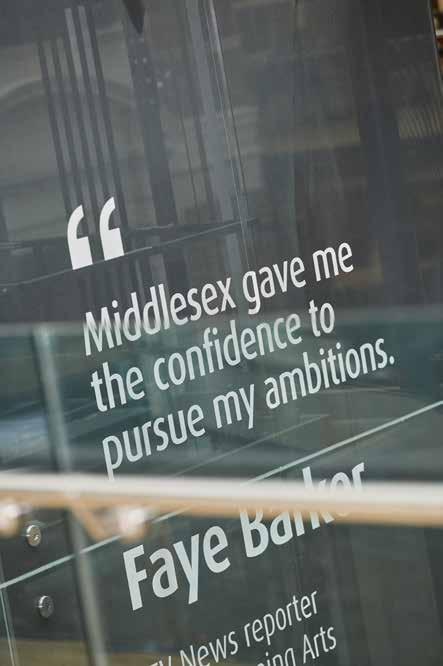
7 minute read
PUSHING BOUNDARIES
SPOTLIGHT ON NIC BEECH AND ANDREA DLASKA AND MIDDLESEX UNIVERSITY
Pushing beyond the normal limits of what is possible
MIDDLESEX UNIVERSITY’S VICE CHANCELLOR NIC BEECH AND DEPUTY VICE CHANCELLOR ANDREA DLASKA TELL JUSTINE GREENING ABOUT THEIR APPROACH TO SOCIAL MOBILITY.
JG // When I visited the university I was amazed at how much of a community it was, but also how much the students themselves are part of running it and maintaining it. They are really at the heart of it – not just of the learning experience, but how the wider university works and runs.
AD // Many of our students are the first in their families to go to university. They commute, they have other responsibilities and sometimes it can be quite difficult to go and ask for help or to become part of a community. We work really hard to ensure that all students feel comfortable joining the community and using our students and working closely with our students on this means that you talk to your peers a lot of the time, when you want to find out where can to get help and where to find like minded people. So it’s absolutely crucial that we
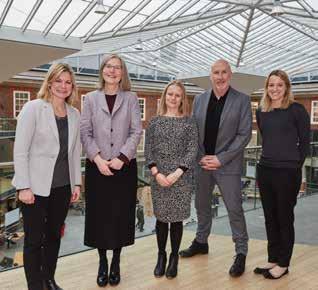
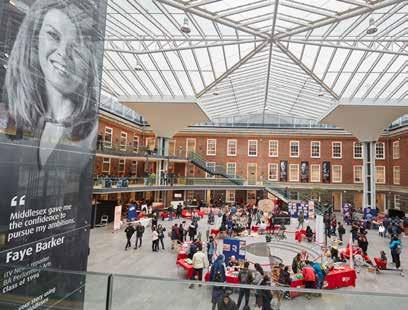
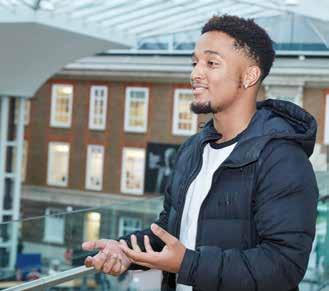
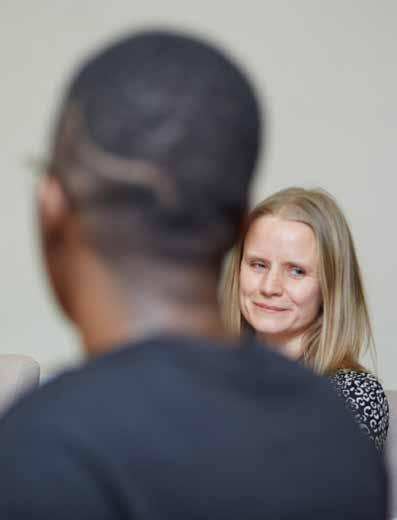
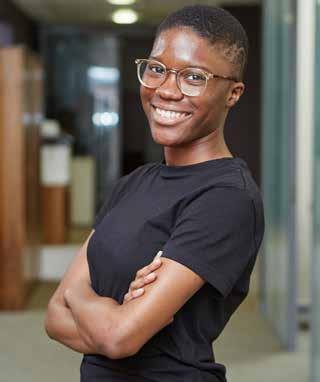
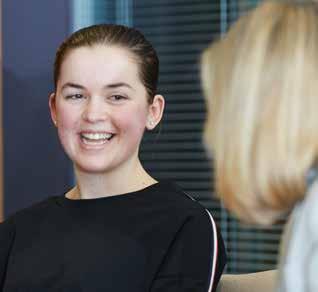
work with our students union, but also with our student learning assistants, other student groups [and]ambassadors, who we pay, and who say they really feel they are Middlesex employees. They can contribute to the success of their peers.
JG// Nic you have come into this role as vice chancellor comparatively recently. What’s your impression of the university having been in the role now for a few months?
NB// I started in February and was going around trying to meet as many people as possible - and six weeks later, we were all doing it at a distance. You mentioned the word community and that is so important for us and is so evident in the way people are. There’s a real commitment to each other, and to having a learning community in which, it’s not that any of us pretend to know all the answers, but that we’re actually really interested in each other, and how we can be in dialogue, and become changed ourselves because we engage with others. We’ve really been thinking about ourselves doing co-leadership with the students so that it’s not really a top down model, it’s much more about working out what our values and our priorities are - and our students are right at the heart of that. So we’re really not an ‘us and them’ community, there’s one big us and it’s quite diverse. So people bring different things to the table, but we’re united in our values and what we’re trying to do.
JG// Many of your students are commuter students; some are more mature and often have other responsibilities. Tell us a little bit about how you feel that brings a real diversity to the university, and also the challenges it presents.
NB// We’re one of the most diverse universities in the country by far and that is a wonderful privilege. But it means that you’ve then got to be really conscious of translation between different ways of thinking. We’ve got great diversity, for example of faith groups, we’ve got diversity in terms of ethnicity and gender, but also in terms of background, and that makes a big difference. For me, it’s about us being a learning, enquiring community in which our starting point is not that we assume we know what the other people are like, and we certainly don’t assume that we’re all the same as each other. So you don’t tend to generalise like that, but you do start off with some questions [to establish] what is it that we’re trying to achieve here? How do we best learn in collaboration with each other? There’s a huge amount I learn from our commuter students who are balancing and juggling many responsibilities, but bring different experience into all of our sessions. That’s what actually can help us be really creative in the way we work.
AD// The unique strengths our students bring are so striking, in terms of how their life experiences have shaped them. Living at home having responsibilities for their family, working, being the first in family to go to university gives, them a unique perspective on what is discussed in the classroom. Employers are really beginning to recognise that. Our partners tell us that they really need that diversity in their businesses to succeed. So we’re on a good journey there but the challenge is to really help our students to translate that grit, experience and ambition that they have into something that employers can understand is valuable for their business. So you really don’t say ‘write a CV, and these are the other bits and pieces that you should mention’, because often they haven’t had that opportunity of travel or an internship in the summer. But they bring other things to the table. So we say, ‘tell your story and make sense for an employer out of what you bring to the table’. That’s been really successful. We have a number of projects, with the Ministry of Justice, PwC and others, where we are really working together to see how we can use the strength that our students bring and how they articulate it to open up opportunity for them.
JG// That drive is so important. But also, isn’t it important that we have a really open workplace and recruitment practices so that fantastic students like the ones at Middlesex University really can have those doors open to them and have a good crack at getting the opportunities that are out there.
NB// One in seven of our students becomes an entrepreneur and I don’t think that’s any accident. That is because they’ve got such drive and they’ve pushed themselves beyond the normal limits to do what they’ve done in their degrees. Then they’re fantastic at starting up businesses, and social enterprises, subsequently. But also, I think the doors of many large employers are not as open as they would aspire to them being. There are lots of systemic forms of bias, often unconscious, in the system.
Even in London, if you look at the ethnicity pay gap, it’s a 21.7 per cent disadvantage in terms of pay for minority ethnicities. Whereas for our student population, it’s over 63 per cent from those same ethnicities. So there are just indications there that, while the students are really moving on, they’re being really ambitious, they’re doing exciting things, and a lot of the corporate world wants to be in that ballpark, there’s a bit of catching up to do. That’s probably about opening up both employment systems, talent management programmes, mentoring and other sorts of support in which we can help the students access both employment and entrepreneurship.
JG// What are some of the things you’d like to see employers do differently to help make their doors more open to as many graduates as possible?
AD// I think the main thing is that we really want employers to think again about what talent means to them, and what skills they really need, and what evidence they use to find out whether the person who’s submitted something in writing [is right for them]. Really take a different look at the young people in front of them and ask in a different way, and look to what they themselves may have done on their educational journeys, in terms of travelling, volunteering and gap years, because many of the very talented young people out there haven’t had that opportunity but they will bring something much more valuable to the business.
NB// It’s really I think about forming collaborative advantage between these different parts of society. It’s a huge advantage to the employers to reach in and work with us, and that’s what we want to do with them. So giving opportunities for project work so that students aren’t doing unpaid internships when they’re already doing part time jobs to support themselves. [Also], reimagining and rethinking through the term ‘pipeline’ so it doesn’t end up as a leaky pipeline, which it is at the moment. Certainly redefining how evidence of competency is gathered and understood. For example, thinking about gender and name-blind paths to selection processes. Also, role modelling and having access to those role models… What can be really effective is people who have recently moved into those organisations being accessible to students and to others, to have a conversation about how that’s happened and to build the relationship to personalise it.
